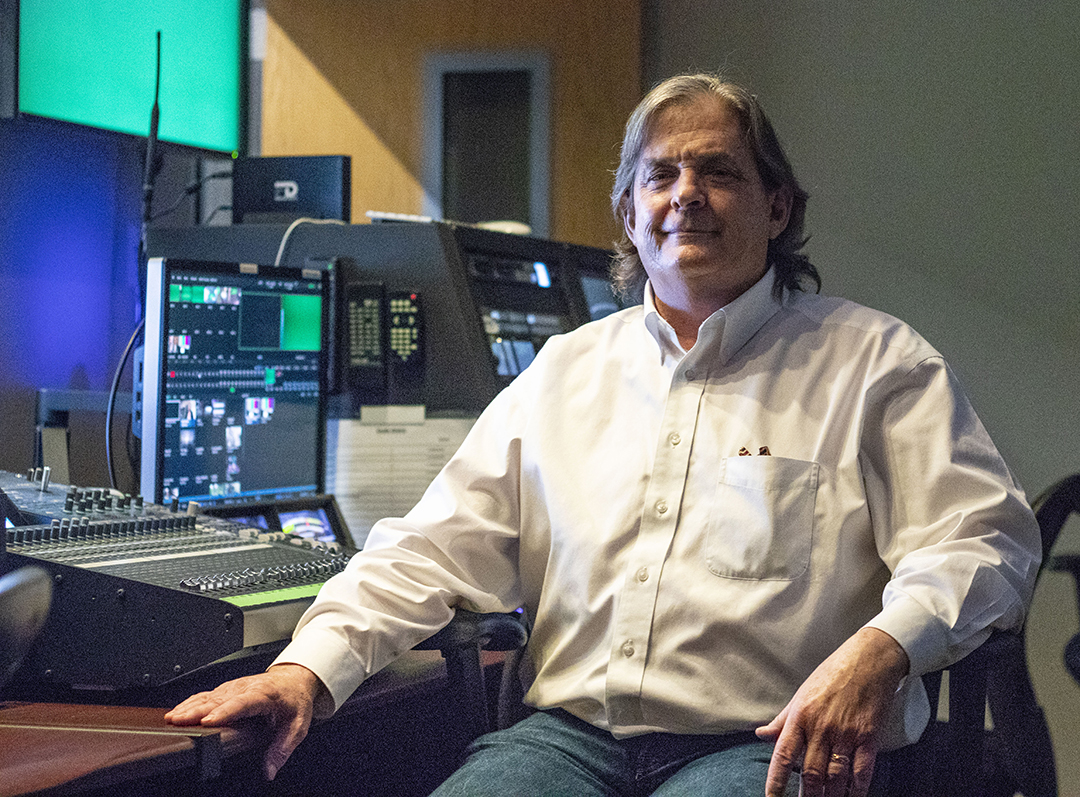By Michael Foster-Sanders/campus editor
Journey guides RTVF students
NE instructional associate Patrick Hogan has lived by one motto in his 40-year career in audio recording.
“You get out of it what you put into it,” he said.
Hogan said his love for music came from his father’s record collection where he could sample a variety of genres such as blues, rock and soul.
“My father listened to anything and everything,” he said. “If it made his foot move, he would listen to it.”
Hogan purchased a mixer and started live sound engineering shows for bands around the end of his sophomore year in high school. While most of his friends were at home doing normal high school stuff such as homework, Hogan was at bars honing his live sound engineering chops.
“I was doing sound at two places in Dallas, the notorious Mother Blues and Gertie’s,” he said. “Between the two, I did sound for the New York Dolls, Ray Wylie Hubbard and David Johansen — people who were just up and coming, so that was neat.”
After finishing high school, Hogan went straight into being a roadie, landing a job with the company Showco who was big on the touring scene. But after a year on and off the road, he decided the tour life was not for him. He was constantly moving around and not making much money.
The life of a roadie is often romanticized as being one of the greatest jobs in the music field, but Hogan had a different perspective.
“I did a short thing with Led Zeppelin,” he said. “But I was a roadie, and it sounds cool, right, but it’s not, you’re basically lower than pond scum.”
Hogan’s initial dream was to go to Berklee College of Music in Boston for a degree in audio engineering, but he couldn’t afford it. Yet his sound experience he learned at the bars and on the road put him into the position to get a job at a jingle company with a full studio.
“Chuck Webster from Showco took me under his wing, and he was TM Productions’ technician, so I went down and applied to be an intern ‘cause all I knew was live recording, and it’s different than being in an actual studio,” he said.
Rather than a studio dedicated to a particular genre, working at a jingle house allowed him to cut his teeth in every genre and do a little bit of everything.
“In the day, I worked in the warehouse, and I spent my nights being an intern,” he said. “After a year of that, I became an editor working with audio tape editing the jingle packages.”
Hogan worked his way up to being a partner with the company and sold his share in 1996. He became a journeyman between jobs until he decided to go back to school on NE Campus, where he graduated with an associate degree. He became a part of the campus’ radio/television/film program in 2013.
Former RTVF coordinator Adrian Neely said when he first started to teach on campus and tried to carry the load of the department on his back, Hogan told him he could help him so Neely wouldn’t be overwhelmed.
“I feel like Mr. Hogan cares about the department and wants to see it do well,” Neely said. “Sometimes you can be here, and it’s a lot asked of you, and to still do it in a good way even when it’s set up in a way to be difficult for you says a lot of your character.”
NE student Corwin Gille said Hogan was an inspiration to him from the first moment he became a student in the program.
“Every time you talk to Hogan, you are going to learn something new that will stick with you,” he said. “I really don’t think the department would be the same without having him here.”
Hogan is an important piece of the RTVF program, according to instructional TV specialist Darryl Hoelting.
“He’s willing to share any knowledge that he has from audio to video, and if somebody is having an issue within the department that’s technical-wise, he won’t back down from the challenge to resolve it,” Hoelting said.

